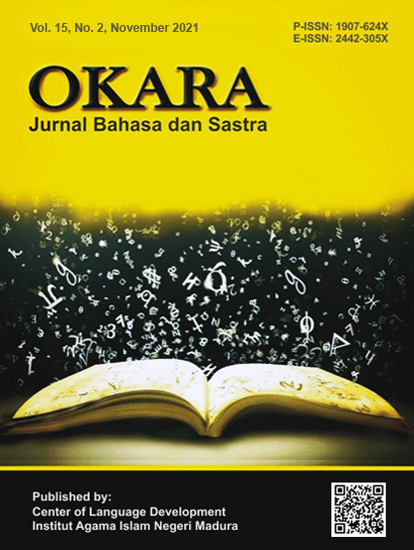Representation of Self-Concept in the Collection of Children's Stories from Bobo Magazine
 Abstract views: 489
,
Abstract views: 489
,
 PDF downloads: 456
PDF downloads: 456
Abstract
As construction of thought, self-concept will continue to grow and develop following the life experiences, one of which can come from stories. Therefore, this study aims to uncover and describe indicators of self-concept from children's stories. The data was obtained based on ten children's stories from the online version of Bobo magazine published in 2019-2020. This research used the content analysis method with categorization and tabulation until inference was found. The results revealed that Bobo magazine had implied self-concepts in the published stories. Among them, such as self-identity related to the labels attached by other characters as well as the character's desire to be what kind of self; personal behavior related to the views of other characters and figures in viewing their behavior; and self-judgment related to the acceptance or rejection of the character's behavior. Then, the physical self-concept associated with gender and character skills; moral self-concept related to the character's ability to control his behavior; personal self-concept related to good relations between characters; family self-concept related to the character's relationship with his family members; and social self-concept related to the character's relationship with his peers. These findings appear to confirm the representation of self-concepts in Indonesian children's short stories.
Downloads
References
Agustiani, Hendriati. Psikologi Perkembangan. Bandung: PT. Refika Aditama, 2009.
Apriliya, Seni, Dadang Sunendar, Yeti Mulyati, and Sumiyadi. “Social Identity in Indonesian Children’s Literature: Materials of Self-Literacy for Elementary Students,” 548–50. Atlantis Press, 2018. https://doi.org/10.2991/amca-18.2018.152.
Bailey, Joseph A. “Self-Image, Self-Concept, and Self-Identity Revisited.” Journal of the National Medical Association 95, no. 5 (2003): 383–86.
Burns, Robert B. Konsep Diri: Teori, Pengukuran, Perkembangan dan Perilaku. Translated by Eddy. Bandung: Arcan, 1993.
Farahiba, Ayyubi Subhi. “Eksistensi Sastra Anak dalam Pembentukan Karakter pada Tingkat Pendidikan Dasar.” Waskita: Jurnal Pendidikan Nilai dan Pembangunan Karakter 1, no. 1 (2019): 47–59. https://doi.org/10.21776/ub.waskita.2017.001.01.3.
Fitts, William H., and W. Louis Warren. Tennessee Self-Concept Scale. 2nd ed. California: Western Psychological Services, 1996.
Hayati, Yenni. “The Use of Foreign Languages in Children Literature in Indonesia.” Humanus 15, no. 2 (2016): 226–35. https://doi.org/10.24036/jh.v15i2.6511.
Hurlock, Elizabeth Bergner. Child Development. 5th ed. New York: McGraw-Hill, 1978.
Kurniawan, Heru kurniawan, Herman J. Waluyo, Sarwiji Suwandi, and Budhi Setiawan. “Kepribadian Moral Ideal Anak dalam Cerita Anak pada Majalah Bobo dan Harian Kompas.” Lingua 14, no. 2 (2018): 226–40.
Lichtwarck-Aschoff, Anna, Paul van geert, Harke Bosma, and E. Kunnen. “Time and Identity: A Framework for Research and Theory Formation.” Developmental Review 28, no. 3 (2008): 370–400. https://doi.org/10.1016/j.dr.2008.04.001.
Millward, Louise M., and Michael P. Kelly. “Incorporating the Biological: Chronic Illness, Bodies, Selves, and the Material World.” In Debating Biology. London: Routledge, 2003.
Minderop, Albertine. Psikologi Sastra: Karya Sastra, Metode, Teori, dan Contoh Kasus. Jakarta: Yayasan Pustaka Obor Indonesia, 2010.
Moleong, Lexy J. Metodologi Penelitian Kualitatif. Bandung: Remaja Rosdakarya, 2009.
Nirwana. “Konsep Diri, Pola Asuh Orang Tua Demokratis dan Kepercayaan Diri Siswa.” Persona: Jurnal Psikologi Indonesia 2, no. 2 (2013): 153–61. https://doi.org/10.30996/persona.v2i2.103.
Nurgiyantoro, Burhan. “Sastra Anak: Persoalan Genre.” Humaniora 16, no. 2 (2012): 107–22. https://doi.org/10.22146/jh.811.
Richter, Tobias, Markus Appel, and Frank Calio. “Stories Can Influence the Self-Concept.” Social Influence 9, no. 3 (2014): 172–88. https://doi.org/10.1080/15534510.2013.799099.
Saptawuryandari, Nurweni. “Cerita Pendek Anak dalam Majalah Bobo Tahun 1980‐an sebagai Bacaan Pendidikan Karakter.” ATAVISME 17, no. 2 (2014): 254–63. https://doi.org/10.24257/atavisme.v17i2.14.254-263.
Sarumpaet, Riris K. Toha. Pedoman Penelitian Sastra Anak. Jakarta: Yayasan Pustaka Obor, 2010.
Schumm, Jeanne Shay, Jill Lewis-Spector, Debra Price, and Kristen Doorn. “A Content Analysis of College Reading Association/Association of Literacy Educators and Researchers Teacher Education Publications: Past, Present, and Future.” Literacy Research and Instruction 53, no. 3 (2014): 225–44. https://doi.org/10.1080/19388071.2013.847132.
Silva, Wellington Amancio da. “Literature Children - Child as Protagonist.” International Journal of Elementary Education 3, no. 3 (2014): 54. https://doi.org/10.11648/j.ijeedu.20140303.11.
Tsakiris, Manos. “Self and Brain.” In International Encyclopedia of the Social & Behavioral Sciences (Second Edition), edited by James D. Wright, 419–23. Oxford: Elsevier, 2015. https://doi.org/10.1016/B978-0-08-097086-8.56034-6.
Uszyńska‐Jarmoc, Janina. “The Conception of Self in Children’s Narratives.” Early Child Development and Care 174, no. 1 (2004): 81–97. https://doi.org/10.1080/0300443032000153507.
Wagener, Elaine H. “Does Literature Affect Self-Concept?” Peabody Journal of Education 53, no. 4 (1976): 299–302. https://www.jstor.org/stable/1492283.
The journal operates an Open Access policy under a Creative Commons Attribution-NonCommercial 4.0 International License. Authors who publish with this journal agree to the following terms:
- Authors retain copyright and grant the journal right of first publication with the work simultaneously licensed under a Creative Commons Attribution License that allows others to share the work with an acknowledgement of the work's authorship and initial publication in this journal.
- Authors are able to enter into separate, additional contractual arrangements for the non-exclusive distribution of the journal's published version of the work (e.g., post it to an institutional repository or publish it in a book), with an acknowledgement of its initial publication in this journal.
- Authors are permitted and encouraged to post their work online (e.g., in institutional repositories or on their website) prior to and during the submission process, as it can lead to productive exchanges, as well as earlier and greater citation of published work.





_(1).png)
.png)
.png)
1.png)
.png)
.png)

.png)
_-_Copy_-_Copy.png)





